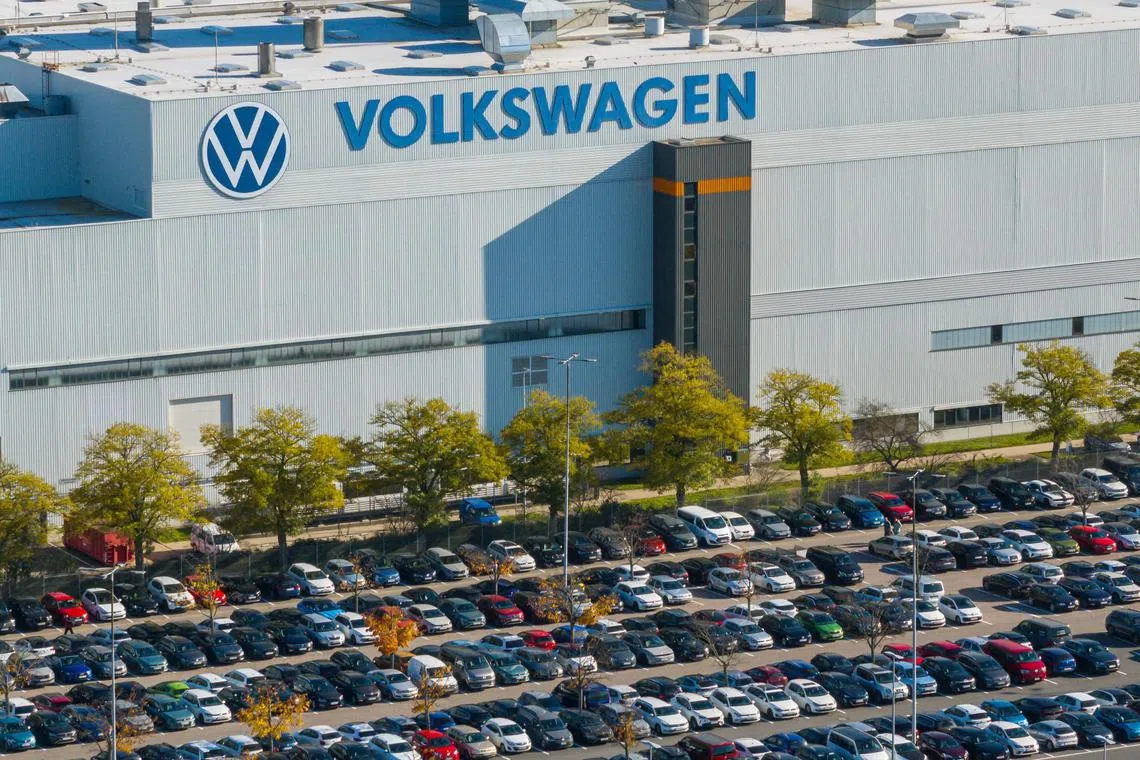Germany’s unwanted auto workers find home in defence ramp-up
Sign up now: Get ST's newsletters delivered to your inbox

Volkswagen is locked in tense talks with unions as the carmaker seeks to retrench.
PHOTO: AFP
German auto workers are finding a lifeline with defence contractors, who are ramping up hiring just as the faltering car industry cuts back on jobs.
Munich-based radar-maker Hensoldt is in talks to hire full teams from two auto-parts suppliers – in one case up to 100 people – to keep up with a surge in military orders, chief executive officer Oliver Dorre said. “The current struggle of the automotive industry is a pure chance for us,” Mr Dorre said on Dec 13 in an interview with Bloomberg Television.
The teams consist of software engineers and will add to Hensoldt’s ranks after the company hired around 1,000 employees in 2024, Mr Dorre said, declining to name the auto-parts suppliers. He sees Hensoldt’s headcount expanding by a similar number in 2025, and plans to be active with new partnerships and potential dealmaking.
Defence spending is on the rise across Europe, giving a boost to weapons-makers as wars in Ukraine and the Middle East drag on and the return of President-elect Donald Trump stokes calls for a stronger commitment to security. Trump has pressed European allies to shoulder more military spending, while political leaders are seeking to channel government funds to home-grown companies and jobs.
At the same time, Europe’s auto industry is grappling with stagnant demand for electric vehicles and increasing competition from China. Parts suppliers including Continental, Bosch and Schaeffler have cut jobs as the slump worsened.
The German auto industry is forecast to shed 12 per cent of its 770,000 jobs by 2030, according to consulting firm PwC, as digitalisation and automation make some current roles obsolete. Volkswagen is locked in tense talks with unions as the carmaker seeks to retrench.
Other defence contractors are also taking in workers. Rheinmetall, which makes tanks and ammunition, said in June that it plans to hire up to 100 workers from tyre manufacturer Continental. French train-car maker Alstom said in November that it was in talks to transfer an unwanted manufacturing site in Gorlitz, Germany, to Amsterdam-based arms company KNDS.
Mr Dorre sees a chance for German defence firms to drive innovation in key areas such as artificial intelligence and software development, after decades of military under-investment. He said that while Germany’s political environment remains rocky, rearmament over the next decade aligns with the political need to bolster the economy.
“The current discussion in the election campaign is a lot about re-strengthening Germany‘s economy, and I think here, the defence and security industry can play a major role,” he said.
Hensoldt, whose top shareholders include Italy’s Leonardo and the German government, can play a role in European defence-sector consolidation, Mr Dorre said, while cautioning that each deal needs to fulfil a specific objective rather than just adding scale.
“2025 will be a year of new partnerships for Hensoldt,” he said. “We are well prepared, if things would move, to act immediately, and even go for a bolder move, if that would be necessary.”
Hensoldt has ramped up production since Russia’s invasion of Ukraine in 2022 as German military spending picked up. The company has raised its medium-term target to 10 per cent annual revenue growth and said it wants to more than double revenue to around €5 billion (S$7 billion) in 2030.
Mr Dorre, though, said politicians need to provide more clarity on spending plans for the longer term in order for contractors to make investments to expand capacity. In Germany, Hensoldt’s biggest market, the government’s decision on whether to set aside strict limits on debt will be key, he said.
“We need the planning security from politicians,” he said. “They have to walk the talk.” BLOOMBERG


